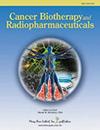METTL3 介导的 FMRP m6A 修饰驱动肝细胞癌进展并预示着不良预后。
IF 2.4
4区 医学
Q3 MEDICINE, RESEARCH & EXPERIMENTAL
引用次数: 0
摘要
越来越多的研究表明,m6A RNA 甲基化在癌症发病和进展过程中起着至关重要的作用。METTL3 作为一种 m6A 甲基转移酶,在包括肝细胞癌(HCC)在内的多种恶性肿瘤中充当致癌基因。然而,METTL3 在 HCC 中的作用和潜在机制仍不清楚。我们通过反转录聚合酶链反应、Western印迹和公开的TCGA数据集评估了METTL3表达与HCC患者临床病理特征和预后的关系。为了揭示METTL3在HCC中的作用,研究人员采用了MTT、集落形成、Transwell试验和异种移植肿瘤模型。我们发现,METTL3在HCC组织样本中显著上调,是HCC患者生存率低和肿瘤复发的独立预后因素。抑制 METTL3 可抑制体外和体内的细胞生长和侵袭,但恢复 METTL3 的表达可增强这些效应。机理研究发现,METTL3可直接与FMRP相互作用,并与FMRP的表达呈正相关。敲除 METTL3 会降低 FMRP m6A 水平及其 mRNA 和蛋白表达。FMRP的过表达促进了细胞集落的形成和细胞的侵袭,并消除了METTL3敲除诱导的抗肿瘤效应和AKT/mTORC1信号的失活。FMRP 表达的升高可能是导致 HCC 患者生存率低和肿瘤复发的独立预后因素。我们的研究结果表明,METTL3 介导的 FMRP m6A 修饰促进了 HCC 细胞的生长和侵袭,可能为 HCC 提供了一个有前景的治疗靶点。本文章由计算机程序翻译,如有差异,请以英文原文为准。
METTL3-Mediated m6A Modification of FMRP Drives Hepatocellular Carcinoma Progression and Indicates Poor Prognosis.
Accumulating studies reveal that m6A RNA methylation plays a critical role in cancer pathogenesis and progression. METTL3 as a m6A methyltransferase acts as an oncogene in multiple malignancies including hepatocellular carcinoma (HCC). However, the role and underlying mechanism by which METTL3 contributes to HCC remain unclear. The association of METTL3 expression with clinicopathological characteristics and prognosis in patients with HCC was assessed by reverse transcription polymerase chain reaction, Western blot, and public TCGA dataset. MTT, colony formation, Transwell assays, and xenograft tumor models were executed to reveal the role of METTL3 in HCC. m6A dot blot, RNA immunoprecipitation (RIP), m6A methylated RIP, and Western blot assays were used to uncover the regulatory mechanism of METTL3 in HCC cells. We found that METTL3 was dramatically upregulated in HCC tissue samples and acted as an independent prognostic factor for poor survival and tumor recurrence in patients with HCC. Silencing of METTL3 repressed cell growth and invasion in vitro and in vivo, but restored expression of METTL3 boosted these effects. Mechanistical investigations revealed that METTL3 could directly interact with FMRP and harbor a positive correlation with FMRP expression. Knockdown of METTL3 reduced FMRP m6A levels as well as its mRNA and protein expression. FMRP overexpression drove cell colony formation and cell invasion and abolished METTL3 knockdown-induced antitumor effects and AKT/mTORC1 signaling inactivation. Elevated expression of FMRP could act as an independent prognostic factor for poor survival and tumor recurrence in patients with HCC. Our findings demonstrate that METTL3-mediated m6A modification of FMRP promotes growth and invasion of HCC cells and may provide a promising therapeutic target for HCC.
求助全文
通过发布文献求助,成功后即可免费获取论文全文。
去求助
来源期刊
CiteScore
7.80
自引率
2.90%
发文量
87
审稿时长
3 months
期刊介绍:
Cancer Biotherapy and Radiopharmaceuticals is the established peer-reviewed journal, with over 25 years of cutting-edge content on innovative therapeutic investigations to ultimately improve cancer management. It is the only journal with the specific focus of cancer biotherapy and is inclusive of monoclonal antibodies, cytokine therapy, cancer gene therapy, cell-based therapies, and other forms of immunotherapies.
The Journal includes extensive reporting on advancements in radioimmunotherapy, and the use of radiopharmaceuticals and radiolabeled peptides for the development of new cancer treatments.

 求助内容:
求助内容: 应助结果提醒方式:
应助结果提醒方式:


